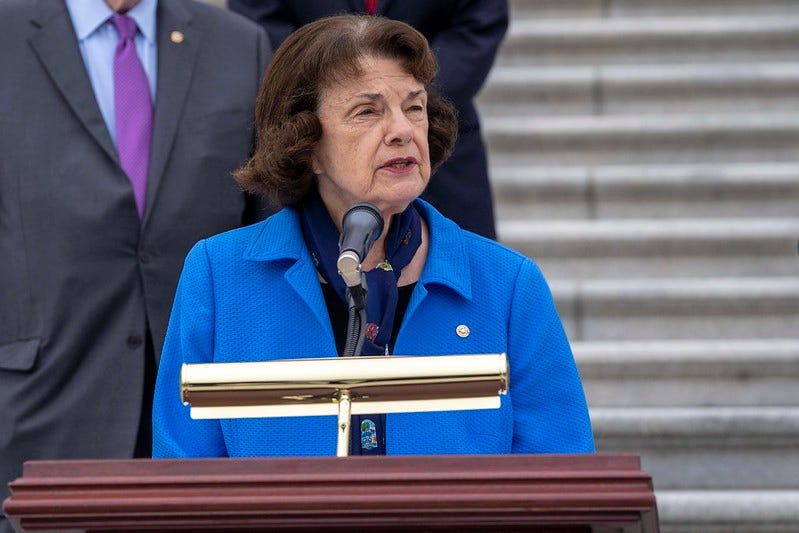Wake Up To Politics - Januay 25, 2022
Wake Up To Politics: Should lawmakers be able to own stocks?
by Gabe Fleisher
Good morning! It’s Tuesday, January 25, 2022. Election Day 2022 is 287 days away. Election Day 2024 is 1,015 days away.
Should lawmakers be able to trade stocks?
There aren’t many issues that unite Reps. Matt Gaetz, the Trump-friendly Republican from Florida, and Rashida Tlaib, the far-left Democrat from Michigan.
And yet there their names are, right next to each other on a recent letter to congressional leadership:
The issue at hand is one that has been quietly gaining steam in Washington in recent week: a push to ban members of Congress from owning or trading stocks, in order to avoid the type of conflicts of interest that are currently rampant on Capitol Hill.
Here’s some background. Currently, lawmaker’ stock market activities are policed by the Stop Trading on Congressional Knowledge (STOCK) Act, a 2012 law that prohibited members of Congress and other government employees from engaging in insider trading (using non-public information gleaned through official business for personal gain).
The law also requires members of Congress to disclose any stock trades within 45 days.
However, the law rarely been enforced: charges have never been brought under the statute, despite a recent investigation by Insider that found 54 members of Congress have failed to fully comply with the STOCK Act’s disclosure requirements.
Some questionable trades have also come to light recently, such as the revelations that Sen. Richard Burr (R-NC) and the husband of Sen. Dianne Feinstein (D-CA) each sold a fortune in stocks after senators received a private briefing on Covid-19 in February 2020. (Investigations into both senators were later dropped.)
After Insider’s reporting, the Covid-era trades, and an insider trading scandal at the Federal Reserve, momentum is building to introduce stricter rules on lawmakers. There are at least four separate efforts to prohibit members of Congress from trading individual stocks by requiring them to divest their holdings or place them in a blind trust:
The Ban Congressional Stock Trading Act, introduced by Sens. Jon Ossoff (D-GA) and Mark Kelly (D-AZ)
The Banning Insider Trading in Congress Act, introduced by Sen. Josh Hawley (R-MO)
The Ban Conflicted Trading Act, introduced by Rep. Raja Krishnamoorthi (D-IL) and supported by Gaetz, Tlaib, and others from both parties
The Transparent Representation Upholding Service and Trust (TRUST) in Congress Act, introduced by Reps. Abigail Spanberger (D-VA) and Chip Roy (R-TX)
There are subtle differences between the bills. For example, Ossoff/Kelly and Spanberger/Roy proposals would also apply to lawmakers’ spouses and dependent children, while the others would not. The Krishnamoorthi bill would apply to senior congressional staffers, while the others would not.
They also vary in their enforcement mechanisms: for example, the Hawley bill would require violating lawmakers to forfeit any profits to the federal government, while the Ossoff/Kelly bill would punish lawmakers by seizing one year’s worth of their congressional salary.

Do any of these proposals have a path to passage? Possibly, but it will be an uphill battle to get lawmakers to police themselves. House Speaker Nancy Pelosi (D-CA) expressed opposition to such bills back in December (“We’re a free market economy,” she said), although she seemed to soften her position at a press conference last week.
“I just don’t buy into it, but if members want to do that, I’m OK with that,” Pelosi said. The speaker, whose is one of the wealthiest members of Congress and whose husband is a prolific stock trader, also expressed openness to increasing the fines for lawmakers who fail to comply with the STOCK Act.
Meanwhile, House Minority Leader Kevin McCarthy (R-CA) is also mulling whether to give his blessing to the efforts: per Bloomberg, McCarthy is considering banning lawmakers from trading stocks as part of the House’s biannual rules package if the GOP wins control of Congress in November.
The letter that brought together Gaetz and Tlaib was sent to McCarthy and Pelosi to urge them to “swiftly bring” one of the stock trading bans to the House floor. Sent on Monday, the letter was signed by a total of 27 House members, including Democrats and Republicans.
“There is no reason that members of Congress need to be allowed to trade stocks when we should be focused on doing our jobs and serving our constituents,” the bipartisan group of lawmakers wrote.
“Perhaps this means some of our colleagues will miss out on lucrative investment opportunities. We don’t care. We came to Congress to serve our country, not turn a quick buck.”
The Rundown
More top stories to know this morning.
— Speaking of ethics on Capitol Hill: The Office of Congressional Ethics released two reports on Monday revealing inquires into Reps. Marie Newman (D-IL) and Doug Lamborn (R-CO) that will now be continued by the House Ethics Committee.
The Newman probe concerns allegations that she bribed a possible primary opponent by offering him a job in her office if he didn’t run against her.
The investigation into Lamborn charges that he had his staff use official resources to perform personal and campaign-related tasks for him and his family.— Ukraine: The Defense Department placed 8,500 U.S. troops on “heightened preparedness to deploy” to eastern Europe on Monday, as NATO seeks to shore up its eastern flank in case Russia invades Ukraine. The Pentagon’s top spokesman said Russia has shown “no intention of de-escalating” and is instead “adding more force capability” to its border with Ukraine.
— Biden vs. Doocy: After an event on Monday, President Biden could be hard calling Fox News correspondent Pete Doocy a “stupid son of a bitch” after Doocy asked him a question about inflation. Biden, who promised to treat reporters with respect during the 2020 campaign but has previously snapped at others questioning him, called the journalist later that day to clear the air. “It’s nothing personal, pal,” Biden said, according to Doocy.
— Two updates on stories I’ve covered recently: Last week, I covered the various investigations into former President Donald Trump, from Georgia to New York to Washington. That story was sparked by a few different developments, including a request from Atlanta prosecutor Fani Willis to impanel a special grand jury to continue her investigation into Trump’s efforts to overturn the Georgia election results in 2020. Willis’ request was granted on Monday; the grand jury will be able to subpoena witnesses, but will not be able to bring charges
In Monday’s newsletter, I noted that the trial over a lawsuit brought by former Gov. Sarah Palin (R-AK) against the New York Times was set to kick off in Manhattan. However, the trial has been delayed by a week after the unvaccinated Palin tested positive for Covid-19 on Monday.
Policy Briefing: Education
On Tuesdays, Wake Up To Politics contributor Kirsten Shaw Mettler offers a roundup of the week’s top education news:
The Supreme Court will hear two cases challenging affirmative action in higher education admissions. The plaintiff, Students for Fair Admissions (SFFA), has brought forward two suits: one alleging that Harvard discriminates against Asian-American applicants, and one that the University of North Carolina admissions discriminates against white and Asian-American applicants. The justices announced Monday that they would take up the two cases, which will be consolidated and heard as one.
The court has upheld affirmative action a number of times, most recently in a 2016 ruling upholding the University of Texas at Austin’s admissions policy. However, the conservative majority on the court has grown since then, and some legal experts have speculated that the justices could deliver a decision banning or significantly limiting the consideration of race in college admissions.
Although such a decision could have drastic impacts on the higher education system, students in the next few admissions cycles will probably not feel these effects. The court will likely not rule on the case until the spring or summer of 2023.

Arizona and Virginia are headed to court over their K-12 mask rules. Last week, the Treasury Department threatened to recoup Covid-19 relief funds given to Arizona, claiming that the state misused the money by using some of it for programs that undermine the use of masks in schools.
On Friday, Arizona sued the Biden administration, saying that the Treasury is overstepping its authority and that public health policy falls out of their discretion.
In Virginia, newly-inaugurated Gov. Glenn Youngkin (R-VA) has barred schools from requiring masks, saying that it should be up to family discretion. Seven school boards are now suing to keep masks mandatory in schools; the Virginia Supreme Court will likely hear the case sometime this week.
More education policy headlines, via Kirsten:
The American College Health Association released guidance on Wednesday advising colleges to use N95, KN95, or surgical-grade masks on their campuses as Omicron causes challenges.
A judge has sided with professors advocating for academic freedom at the University of Florida.
The NCAA voted to amend policies regarding transgender student athletes. The new rules dictate that participation rules will be determined sport by sport, and require transgender athletes to report their testosterone levels at a number of set intervals.
Daybook
All times Eastern.
White House
President Joe Biden will receive his daily intelligence briefing at 10:15 a.m. He has no other items on his public schedule.
Vice President Kamala Harris will join Biden for his 10:15 a.m. intelligence briefing. At 2 p.m., she will deliver remarks to the President’s Interagency Task Force to Monitor and Combat Trafficking In Persons, a group of 20 agency leaders created in 2000 to coordinate the federal government’s efforts to combat human trafficking.
White House press secretary Jen Psaki will hold her daily press briefing at 12:15 p.m.
Congress
The House and Senate are both on recess for the week. The House will briefly convene at 10 a.m. for a pro forma session — a quick meeting in which one member comes to gavel the chamber in, and then promptly gavels it out. No business is conducted during such sessions, which are only held to fulfill the chamber’s constitutional requirements of meeting every three days.
Courts
The Supreme Court does not have any oral arguments or conferences scheduled this week.






